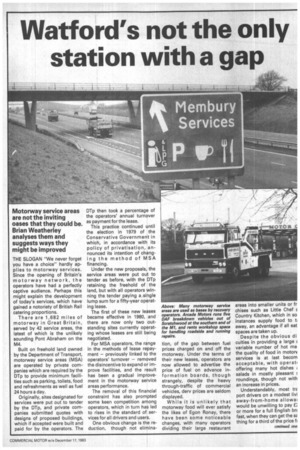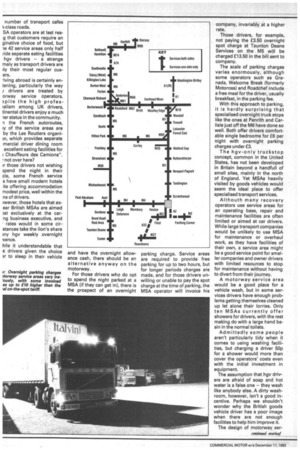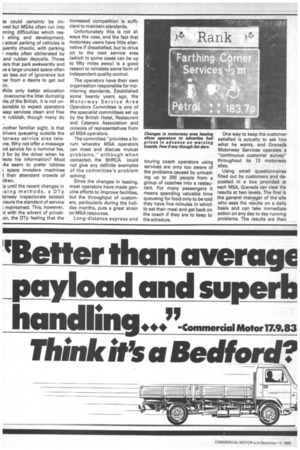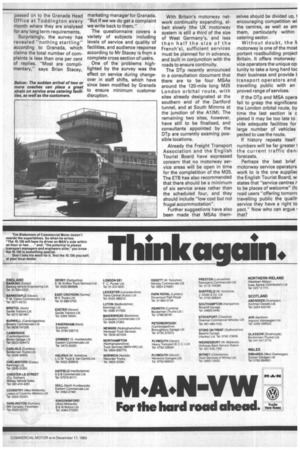I Watford's not the only station with a gap
Page 41

Page 42

Page 44

Page 45

If you've noticed an error in this article please click here to report it so we can fix it.
Motorway service areas are not the inviting oases that they could be. Brian Weatherley analyses them and suggests ways they might be improved
THE SLOGAN "We never forget you have a choice" hardly applies to motorway services. Since the opening of Britain's motorway network, the operators have had a perfectly captive audience. Perhaps this might explain the development of today's services, which have gained a notoriety of British Rail catering proportions.
There are 1,682 miles of motorway in Great Britain, served by 42 service areas, the latest of which is the unlikely sounding Pont Abraham on the M4.
Built on freehold land owned by the Department of Transport, motorway service areas (MSA) are operated by private companies which are required by the DTp to provide minimum facilities such as parking, toilets, food and refreshments as well as fuel 24 hours a day.
Originally, sites designated for services were put out to tender by the DTp, and private companies submitted quotes with designs of proposed buildings, which if accepted were built and paid for by the operators. The DTp then took a percentage of the operators' annual turnover as payment for the lease.
This practice continued until the election in 1979 of the Conservative Government in which, in accordance with its policy of privatisation, announced its intention of changi n g the method of MSA financing.
Under the new proposals, the service areas were put out to tender as before, with the DTp retaining the freehold of the land, but with all operators winning the tender paying a single lump sum for a fifty-year operating lease.
The first of these new leases became effective in 1980, and there are now only two outstanding sites currently operating whose leases are still being negotiated.
For MSA operators, the range in the methods of lease repayment — previously linked to the operators' turnover — removed the disincentive to expand or improve facilities, and the result has been a gradual improvement in the motorway service areas performance.
The removal of this financial constraint has also prompted some keen competition among operators, which in turn has led to rises in the standard of services for all drivers and users.
One obvious change is the reduction, though not elimina tion, of the gap between fuel prices charged on and off the motorway. Under the terms of their new leases, operators are now allowed to advertise the price of fuel on advance information boards, though strangely, despite the heavy through-traffic of commercial vehicles, dery prices are seldom displayed.
While it is unlikely that motorway food will ever satisfy the likes of Egon Ronay, there have been some noticeable changes, with many operators dividing their large restaurant areas into smaller units or fr chises such as Little Chef E Country Kitchen, which in so instances supply food to t; away, an advantage if all eat spaces are taken up.
Despite the obvious di culties in providing a large variable number of hot me the quality of food in motorv services is at last becom acceptable, with operati offering many hot dishes i salads in mostly pleasant roundings, though not with an increase in prices.
Understandably, most trz port drivers on a modest livi away-from-home allowai would be unwilling to pay C or more for a full English brE fast, when they can get the sE' thing for a third of the price ft
number of transport cafes k-class roads.
SA operators are at last reag that customers require an ginative choice of food, but le 42 service areas only half tide separate eating facilities hgv drivers — a strange maly as transport drivers are ly their most regular cus ers.
lying abroad is certainly en tening, particularly the way / drivers are treated by orway service operators. Spite the high prateslalism among UK drivers, tinental drivers enjoy a much ler status in the community. -1 the French autoroutes, iy of the service areas are by the Les Routiers organi)n, which provides separate mercial driver dining room excellent eating facilities for ; Chauffeurs des Camions". , not over here?
ir those drivers not wishing spend the night in their cle, some French service s have small modern hotels ite offering accommodation modest price, well within the ns of drivers.
wvever, those hotels that exear British MSAs are aimed )st exclusively at the carng business executive, and • rates would in some cir stances take the lion's share iny hgv weekly overnight Vance.
hile it understandable that e drivers given the choice ?.r. to sleep in their vehicle
and have the overnight allowance cash, there should be an alternative anyway on the motorway.
For those drivers who do opt to spend the night parked at a MSA (if they can get in), there is the prospect of an overnight parking charge. Service areas are required to provide free parking for up to two hours, but for longer periods charges are made, and for those drivers unwilling or unable to pay the spot charge at the time of parking, the MSA operator will invoice his company, invariably at a higher rate.
Those drivers, for example, not paying the £3.50 overnight spot charge at Taunton Deane Services on the M5 will be charged £13.50 in the bill sent to company.
The scale of parking charges varies enormously, although some operators such as Granada, Welcome Break (formerly Motoross) and Roadchef include a free meal for the driver, usually breakfast, in the parking fee.
With this approach to parking, it is hardly surprising that specialised overnight truck stops like the ones at Penrith and Carlisle just off the M6 have done so well. Both offer drivers comfortable single bedrooms for £6 per night with overnight parking charges under Q.
The hgv-only truckstop concept, common in the United States, has not been developed in Britain beyond a handfull of small sites, mainly in the north of England. Yet MSAs heavily visited by goods vehicles would seem the ideal place to offer specialised transport services.
Althouth many recovery operators use service areas for an operating base, repair and maintenance facilities are often limited or aimed at car drivers. While large transport companies would be unlikely to use MSA for maintenance or overhaul work, as they have facilities of their own, a service area might be a good service point for smaller companies and owner drivers with limited resources to stop for maintenance without having to divert from their journey.
A motorway service area would be a good place for a vehicle wash, but in some services drivers have enough problems getting themselves cleaned up let alone their lorries. Only ten MSAs currently offer showers for drivers, with the rest making do with a large hand basin in the normal toilets.
Admittedly some people aren't particularly tidy when it comes to using washing facilities, but charging a driver 50p for a shower would more than cover the operators' costs even with the initial investment in equipment.
The assumption that hgv drivers are afraid of soap and hot water is a false one — they wash like anybody else. A dirty washroom, however, isn't a good incentive. Perhaps we shouldn't wonder why the British goods vehicle driver has a poor image when there are not enough facilities to help him improve it.
The design of motorway ser as could certainly be imved but MSAs often run into nning difficulties which rest siting and development. P actual parking of vehicles is luently chaotic, with parking marks often obliterated by and rubber deposits. Those fers that park awkwardly and ve a large unused space often so less out of ignorance but ler from a desire to get out 'in.
Vhile only better education overcome the litter dumping pits of the British, it is not unsonable to expect operators ceep services clean and free -n rubbish, though many do
,nother familiar sight, is that irivers queueing outside the torway service area teleme. Why not offer a message ird service for a nominal fee, I for by the driver when he lects his information? Most As seem to prefer lobbies p space invaders machines their attendant crowds of ldren.
lp until the recent changes in 'sing methods, a DTp torway inspectorate existed nsure the standard of service ; maintained. This, however, it with the advent of privation, the DTp feeling that the increased competition is sufficient to maintain standards.
Unfortunately this is not always the case, and the fact that motorway users have little alternative if dissatisfied, but to drive on to the next service area (which in some cases can be up to fifty miles away) is a good reason to reinstate some form of independent quality control.
The operators have their own organisation responsible for monitoring standards. Established some twenty years ago, the Motorway Service Area Operators Committee is one of the specialist committees set up by the British Hotel, Restaurant and Caterers Association and consists of representatives from all MSA operators.
The committee "provides a forum whereby MSA operators can meet and discuss mutual problems," although when contacted, the BHRCA could not give any definite examples of the committee's problem solving.
Since the changes in leasing, most operators have made genuine efforts to improve facilities, but the throughput of customers, particularly during the holiday months, puts a great strain on MSA resources.
Long-distance express and touring coach operators using services are only too aware of the problems caused by unloading up to 200 people from a group of coaches into a restaurant. For many passengers it means spending valuable time queueing for food only to be told they have five minutes in which to eat their meal and get back on the coach if they are to keep to the schedule.
One way to keep the customer satisfied is actually to ask him what he wants, and Granada Motorway Services operates a "continuous customer survey" throughout its 12 motorway sites.
Using small questionnaires filled out by customers and deposited in a box provided at each MSA, Granada can view the results at two levels. The first is the general manager of the site who sees the results on a daily basis and can take immediate action on any day to day running problems. The results are then passed on to the Granada Head Office at Toddington every month where they are analysed for any long term requirements.
Surprisingly, the survey has revealed "nothing startling" according to Granada, which claims the total number of complaints is less than one per cent of replies. "Most are complimentary," says Brian Stacey, marketing manager' for Granada. "But if we we do get a complaint we write back to them."
The questionnaire covers a variety of subjects including levels of service and quality of facilities, and audience response according to Mr Stacey is from a complete cross section of users.
One of the problems highlighted by the survey was the effect on service during changeover in staff shifts, which have since been modified by Granada to ensure minimum customer disruption. With Britain's motorway network continually expanding, albeit slowly (the UK motorway system is still a third of the size of West Germany's, and less than half the size of the French's), sufficient services must be planned for in advance, and built in conjunction with the roads to ensure continuity.
The DTp recently announced in a consultation document that there are to be four IVISAs around the 120-mile long M25 London orbital route, with sites already designated at the southern end of the Dartford tunnel, and at South Mimrns at the junction of the A1(M). The remaining two sites, however, have still to be finalised, and consultants appointed by the DTp are currently examing possible locations.
Already the Freight Transport Association and the English Tourist Board have expressed concern that no motorway service areas will be open in time for the completition of the M25. The ETB has also recommended that there should be a minimum of six service areas rather than the scheduled four, and they should include "low cost but not frugal accommodation".
Further suggestions have also been made that MSAs them
selves should be divided up, t encouraging competition wi the centres, as well as am them, particularly within catering sector.
Without doubt, the 11, motorway is one of the most portant roadbuilding project Britain. It offers motorway vice operators the unique op tunity to take a long hard loc their business and provide transport operators and travelling public with an proved range of services.
If the DTp and MSA opera fail to grasp the significanc. the London orbital route, by time the last section is c pleted it may be too late to vide adequate facilities for large number of vehicles pected to use the route.
If history repeats itself numbers will be far greater I the current traffic dent forecasts.
Perhaps the best brief motorway service operators work to is the one suppliec the English Tourist Board, w states that "service centres r to be places of welcome" (fa road users "offering tomorrc travelling public the qualit, service they have a right to peat." Now who can argue that?












































































